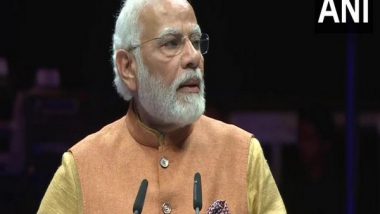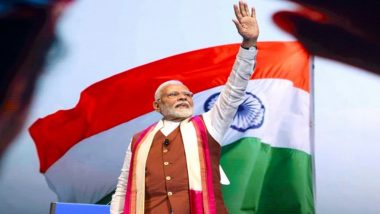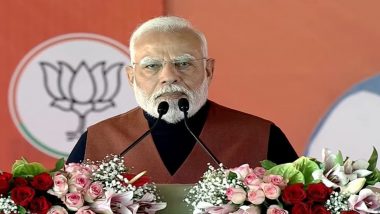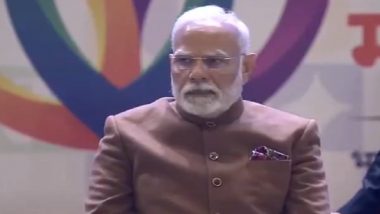Munich, July 3: In the recently concluded G7 meeting in Germany, Prime Minister Narendra Modi underlined the necessity to address the Ukraine conflict in a peaceful manner through dialogue and peace and pitched India as a solution provider for the global food, health and energy crisis as he delivered a clear message to World's richest nations comprising G7.
While he met global leaders in what was a display of excellent chemistry he shares with them, PM Modi's meetings with leaders of Argentina, South Africa and Indonesia, in particular, was an attempt to strengthen South-South Cooperation amid the geopolitical tensions. G7 Summit: PM Narendra Modi Welcomed by Bavarian Band on His Arrival in Munich, Germany (Watch Video).
The PM's two visits to Europe in quick succession had an underlying message that a multipolar order is in the making. Prime Minister Modi met several world leaders, including US president Joe Biden, France's Emmanuel Macron, and Canada's Justin Trudeau, among others. In his diplomatically packed two-day G7 trip he also had long meetings with President of South Africa Cyril Ramaphosa, Chancellor of Germany Olaf Scholz, and President of Indonesia Joko Widodo.
The official Twitter handle of the Prime Minister's Office in India tweeted, "PM @narendramodi and President @jokowi had a productive meeting. Their talks will add strength to the Comprehensive Strategic Partnership between India and Indonesia. Both leaders also discussed ways to boost connectivity and business linkages." He also met the President of the European Union Commission Ursula von der Leyen.
After the G7 summit, PM Modi tweeted that he had a "productive visit" to the European nation. He tweeted, "I thank the people of Germany, @Bundeskanzler Scholz and the German Government for their hospitality during the entire visit. I am confident India-Germany friendship will scale newer heights in the times to come."
"Leaving Germany after a productive visit in which I attended the @G7 Summit, interacted with several world leaders and participated in a memorable community programme in Munich. We were able to discuss many issues aimed at furthering global well-being and prosperity," PM Modi said in a tweet. "We were able to discuss many topics aimed at promoting global well-being and prosperity." He also posted similar texts in the German language.
According to a media report, PM Modi held talks with European Commission President Ursula von der Leyen on the sidelines of the Summit. They held productive discussions with the two leaders and reviewed the India-EU cooperation in trade, investment, technology and climate action.
During their talks, Prime Minister Modi and the EU Commission President welcomed the resumption of negotiations on the trade, investment and geographical indication agreements. This was their second meeting in two months after she visited New Delhi in April. PM Modi is among the signatories of a "Resilient Democracies Statement", issued by the leaders of the G7 nations.
Stating that he had an "excellent meeting" with German Chancellor Olaf Scholz and PM Modi said. "We discussed cooperation in key sectors like commerce and energy. We also had deliberations on furthering environmentally friendly growth for our planet."
"Glad to have met President Cyril Ramaphosa in Germany. Our talks covered diverse sectors including economic cooperation, improving connectivity and deepening ties in food processing and FinTech," PM Modi tweeted after meeting with the South African President.
PM Modi emphasized climate, energy and health at the G7 Summit. He said: "Unfortunately, it is believed that there is a fundamental collision between the developmental goals of the world and environmental protection. There is also another misconception that poor countries and poor people cause more damage to the environment."
"But, India's history of over thousands of years completely refutes this view. Ancient India has seen a time of immense prosperity; then we also tolerated the centuries of slavery, and now independent India is the fastest-growing big economy in the whole world. But during this whole period, India did not let its commitment to the environment get diluted even a single bit. 17 per cent of the world's population resides in India. But, our contribution to global carbon emissions is only 5 per cent. The main reason behind this is our lifestyle, which is based on the theory of co-existence with nature," PM Modi said.
"Our dedication to our climate commitments is evident from our performance. We have achieved the target of 40 per cent energy-capacity from non-fossil sources 9 years before time. The target of 10 per cent ethanol-blending in petrol has been achieved 5 months before time. India has the world's first fully solar power-operated airport," he added.
(This is an unedited and auto-generated story from Syndicated News feed, LatestLY Staff may not have modified or edited the content body)













 Quickly
Quickly




















